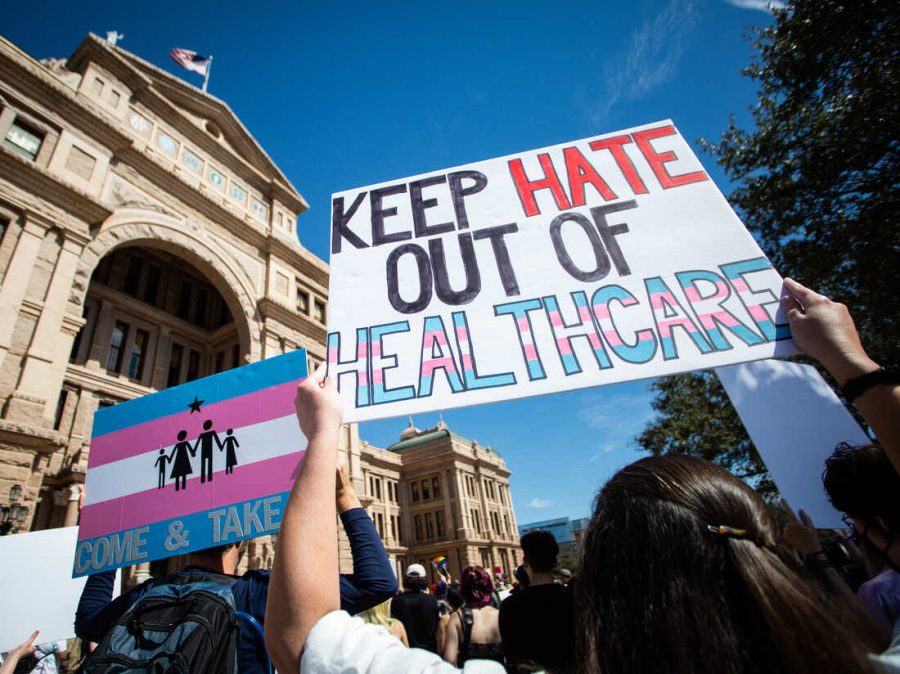Gender-affirming healthcare bans set dangerous precedent
Florida is the most recent state to ban affirming care for minors
Protestors advocate against a trans healthcare ban for minors.
November 16, 2022
On Friday, Nov. 4, the Florida Board of Medicine and the Florida Board of Osteopathic Board of Medicine made drastic changes to their rules regarding the treatment of individuals with gender dysphoria. Specifically, the board’s decision banned doctors from prescribing puberty blockers and hormones, and from performing sex reassignment surgeries on anyone with gender dysphoria under the age of 18.
This follows similar decisions by Alabama and Arkansas, whose legislatures both recently passed bills banning any gender-affirming care to minors. However, medical experts have criticized these moves as dangerous. The American Medical Association called them “a dangerous intrusion into the practice of medicine” and the American Academy of Pediatrics claimed that they’re a part of “a dangerous movement … led by extremists.” Other organizations that have come out in opposition to the bans include, but are not limited to, the Children’s Hospital Association, the American Psychological Association and the Endocrine Society.
The driving force behind Florida’s decision comes from a June 2 letter penned by the state surgeon general, Dr. Joseph Ladapo, urging the two medical boards to review their rules on gender-affirming care given to minors. Ladapo based his recommendations on the results of a state-procured report, which he had authorized, on the effects of gender-affirming care that came out the day of his letter. The report, titled “Generally Accepted Professional Medical Standards on the Treatment of Gender Dysphoria,” found that “[the] available medical literature provides insufficient evidence that sex reassignment through medical intervention is a safe and effective treatment for gender dysphoria.”
In the months since, the validity of the conclusions and methodology of the report have come into question. The review “repeatedly and erroneously dismisses solid studies and clinical practice guidelines as ‘low quality,’” said Dr. Meredithe McNamara, the assistant professor at the Yale School of Medicine. McNamara, who testified before the two Florida medical boards on Oct. 28 criticized the reviewers’ decision to omit a multitude of studies highlighting the positive effects of puberty blockers and hormones on individuals experiencing gender dysphoria. She also criticized the state’s choice of reviewers for the report — a dentist and a biostatistician — explaining that “the National Academy of Medicine stipulates that systematic reviews must be conducted by people who have clinical and research expertise in the area.”
Counter-testimony was also given in favor of the medical boards’ motion. Dr. Michael Laidlaw, an endocrinologist from Rockland, CA, cited studies — the most relevant of which were conducted by Dr. Steensma at the Vrije Universiteit (VU) Amsterdam Medical Center in 2011 and 2013 respectively — which purported to have found that anywhere between “50 to 98 percent” of children experiencing gender dysphoria “gr[ew] out of it by adulthood.” However, the methodology of those studies has been highly criticized by other experts for having standards for ascribing gender dysphoria that are less stringent than that of the DSM-V and for not creating a thorough enough standard to track patients in the long term. On the other hand, a more recent Oct. 2022 study out of Amsterdam University Medical Centers (UMC), found that out of 720 patients “98% [of] people who had started gender-affirming medical treatment in adolescence continued to use gender-affirming hormones at follow-up [during adulthood].”
Dr. Riitakerttu Kaltiala, a professor at Tampere University in Finland, pointed to the fact that many of the studies in support of gender-affirming care were too small to truly get definitive results. However, an analysis of the 2015 U.S. Transgender Survey, which collected answers of over 20,000 transgender individuals, conducted by Dr. Jack Turban and the Stanford Medical School, found that those who accessed gender-affirming hormones at an early age had their odds of severe psychological distress decreased by 222% compared to those who never received those hormones but wanted to. Another study, published in July 2022 and led by Princeton University professor, Kristina Olson, found that only 2.5% of transgender minors de-transitioned after five years.
The state’s best argument for a ban comes from Europe where, as many members of the Board pointed out, many countries have questioned the use of puberty blockers and hormones on minors. In France, the National Academy of Medicine sent out a press release which urged for “great medical caution.” In Sweden, the National Board of Health and Welfare, in its own review of the literature, found that it couldn’t “draw any definite conclusions about the effect and the safety of [puberty blockers and hormones] based on scientific knowledge.” In the United Kingdom, the National Institute for Health and Care Excellence has also cautioned that “any potential benefits of gender-affirming hormones must be weighed against the largely unknown long-term safety profile of these treatments.”
However, even taking in the information disseminated by European nations, it is evident that any reasoning and argument against the use of gender-affirming care on minors is inconclusive and shaky at best. And although some of that evidence may provide justification for caution, as any matter involving children does, it cannot be said that there is enough evidence to warrant an outright ban on the treatments.
Instead, it was political influences that played a key factor in Florida’s medical boards’ decisions rather than the available science. The boards’ members were all appointed by Governor Ron DeSantis, who has taken an ardent and very public stance against gender-affirming care, going so far as to label it “chemical castration.” Furthermore, an analysis conducted by the Tampa Bay Times found that many of the boards’ members have contributed to DeSantis’ reelection campaign, adding up to over $80,000. The two largest contributors, Dr. Ravi Chandra and Dr. Zachariah P. Zachariah, each donated a sum of $25,000. Another member, Scot Ackerman, has a personal relationship with the DeSantis family, having described Casey DeSantis, the Governor’s wife, as “a dear friend … of many years.”
In light of this, the board’s decision comes off as a blatant exercise of pure partisanship to throw away potentially life-changing and life-saving solutions to kids dealing with gender dysphoria, rather than one based in science. And nowhere was this disregard more evident than at the Board of Medicine’s meeting on Oct. 28, when an audience member shouted “the blood is on your hands!” to which Zachariah responded, “I’m OK with that.”












